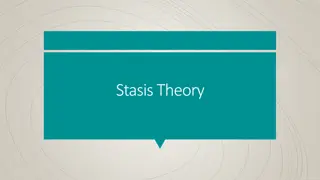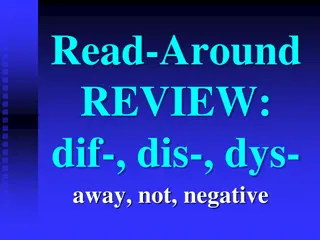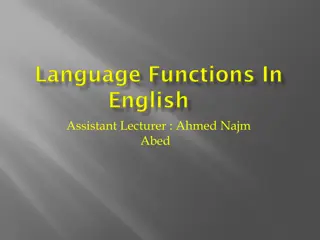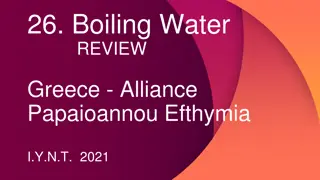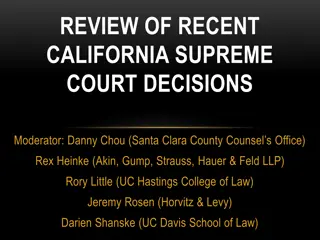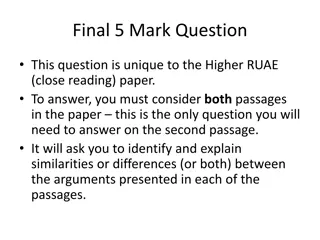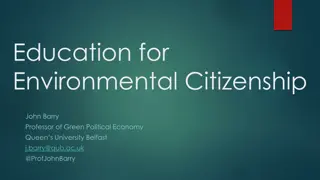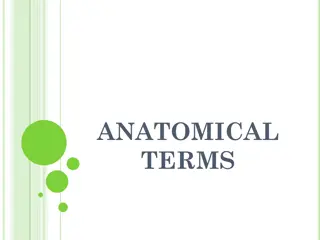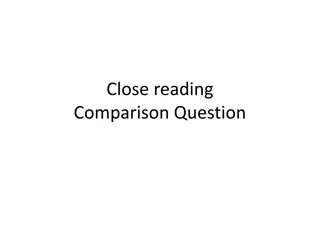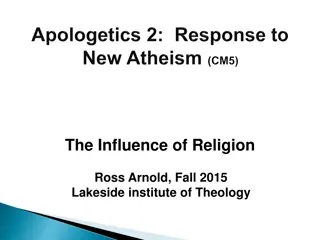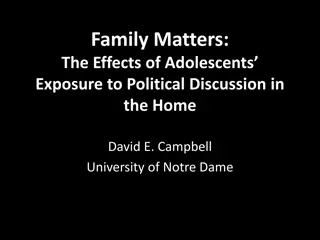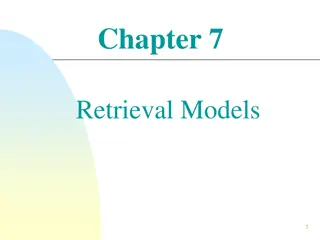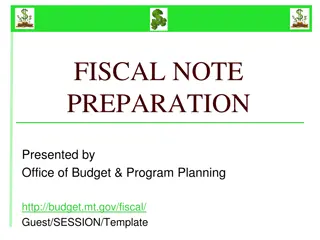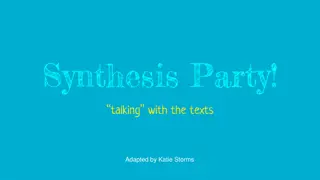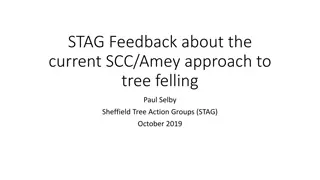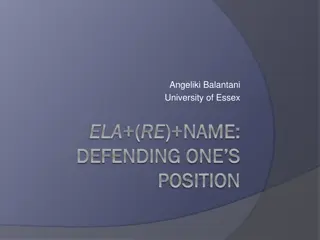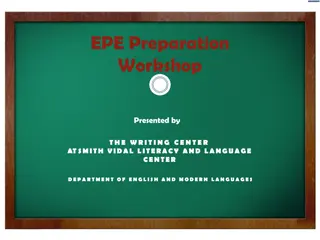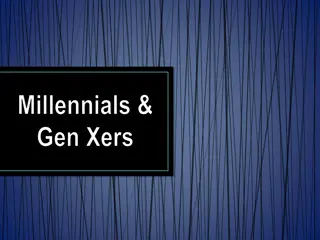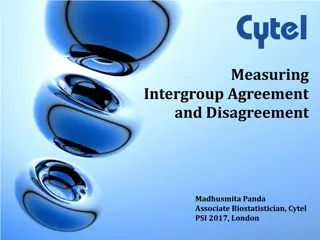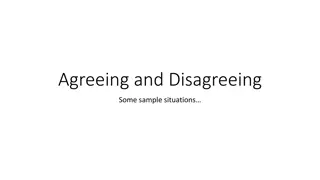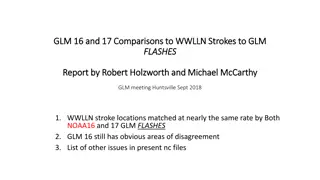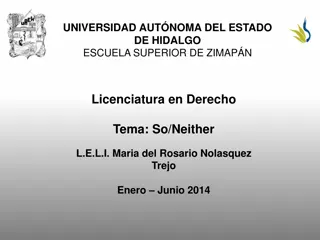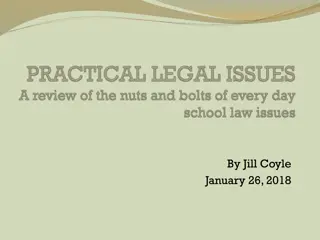Understanding Stasis Theory in Argumentation
Stasis theory in argumentation helps identify the point of disagreement by categorizing issues into facts, definition, quality, and policy. It assists in framing debates and responses to opponents by asking questions about the nature, seriousness, and plan of action regarding the problem or issue at
1 views • 15 slides
Vocabulary Building: Prefixes for Negative Meanings
Explore the prefixes "dif-," "dis-," and "dys-" with words like disagree, disobey, differentiate, and disconnect to understand how they convey negative or opposite meanings. Engage with terms like dismiss, dispense, and differ to grasp the nuances of language when expressing disagreement or non-comp
0 views • 19 slides
Understanding Language Functions and Expressions
Explore the different aspects of language by delving into grammatical descriptions and functional expressions. Discover how language is used for communication, agreement, disagreement, expressing preferences, and introductions. Dive into the nuances of expressing agreement, disagreement, making sugg
0 views • 24 slides
Exploring Management Plane Analytics in Networking
In the realm of networking, Management Plane Analytics (MPA) plays a crucial role in defining and configuring network structures, analyzing the impact of management practices on network health, and predicting network issues. This article delves into the significance of analyzing the management plane
1 views • 19 slides
Review of Boiling Water Experiment - Analysis and Feedback
A detailed review of a boiling water experiment conducted in Greece, analyzing the presentation of theories, experiments, and results. The reporter's lack of theoretical basis and experimental details was highlighted, while the opponent raised insightful questions and corrections. Emphasis was place
3 views • 10 slides
Overview of Recent California Supreme Court Decisions and Statistics
Review recent California Supreme Court decisions, including discussions by legal professionals and statistics on filings, opinions, petitions, and voting disagreement rates. Insights on court workload trends are also provided.
0 views • 46 slides
Analyzing Agreement and Disagreement in High School RUAE Passages
This task involves identifying and explaining similarities or differences between arguments presented in two passages for the Higher RUAE (close reading) paper. The focus is on recognizing key areas of agreement or disagreement and providing supporting evidence from each passage to earn marks. Tips
1 views • 17 slides
Understanding Biased Assimilation and Attitude Polarization in Social Disputes
People with strong opinions on complex social issues tend to interpret evidence in a biased manner, accepting confirming evidence readily while subjecting disconfirming evidence to critical evaluation. This can lead to increased polarization rather than narrowing of disagreement when exposed to the
0 views • 20 slides
Cultivating Environmental Citizenship and Conflict Transformation Skills
Encouraging education for environmental citizenship, this presentation delves into the need for changes in lifestyle, production, and consumption to combat environmental degradation. Emphasizing the importance of understanding numeracy, statistics, and conflict management skills, it advocates for no
0 views • 14 slides
Connect and Disagree: A Social Experiment
Find a stranger, discover common ground and fundamental disagreement in 5 minutes. Dive deep to explore differences without judgment. The exercise aims to foster understanding and empathy between unfamiliar individuals.
0 views • 29 slides
Anatomical Terminology Evolution: From Latin to Modern Standards
Anatomical terms have evolved over centuries into a unified nomenclature system known as Nomina anatomica. This system, initially based on Latin and Greek words, faced confusion and disagreement among anatomists, leading to revisions and the introduction of modern anatomical terminology. The structu
0 views • 27 slides
Analyzing Two Passages for Areas of Agreement and Disagreement
Explore how to tackle the final question that involves comparing two passages, focusing on identifying key areas of agreement and disagreement in the writers' viewpoints. Learn about the marking criteria, examples of bullet points, and tips to earn a high score by referencing important ideas from th
0 views • 41 slides
Exploring the Clash Between New Atheism and Biblical Morality
The clash between New Atheists and biblical morality is highlighted in their differing views on ethics, justice, and religious teachings. Christopher Hitchens and Richard Dawkins express skepticism towards biblical moral codes, while advocating for a secular set of ethical principles. The debate enc
0 views • 10 slides
Effects of Adolescents' Exposure to Political Discussion in the Home
This study by David E. Campbell explores how adolescents' exposure to political discussions within the family impacts their participation, efficacy, comfort with conflict, and deliberation. Conducted in the US with 2,500 parent-teen dyads, the survey examines the frequency of family deliberation and
0 views • 31 slides
Understanding Retrieval Models in Information Retrieval
Retrieval models play a crucial role in defining the search process, with various assumptions and ranking algorithms. Relevance, a complex concept, is central to these models, though subject to disagreement. An overview of different retrieval models like Boolean, Vector Space, and Probabilistic Mode
0 views • 56 slides
Fiscal Note Preparation Process and Guidelines
Fiscal notes are essential for bills affecting state finances. This includes the total processing time, exceptions, and what to do if there is disagreement on the fiscal note. The process involves multiple steps, including drafting, review, and resolution of disagreements. The President of the Senat
0 views • 29 slides
European Union Policy: The Polish and Czech Conflict Approach
The European Union is navigating conflicts and differences in policies between Poland and Czech Republic. The disagreement over a new gas pipeline to Russia, discussions in Prague, visits in France, Brexit implications, and refugee procedures are some of the key topics shaping the EU's current lands
0 views • 17 slides
Interactive Essay Workshop: Enhancing Critical Thinking Skills
Engage in a comprehensive and structured approach to analyzing and synthesizing texts through activities such as quick reading, source analysis, identifying credibility, agreement, disagreement, and connections to personal viewpoints. Develop a strong thesis statement based on a guided process for e
0 views • 7 slides
Evaluation of SCC/Amey Approach to Tree Felling - STAG Feedback
Sheffield Tree Action Groups (STAG) provided feedback on SCC/Amey's current approach to tree felling, highlighting issues with past decision-making processes and outlining hopes for future collaborative efforts. The background context includes obligations from the PFI contract and concerns about the
0 views • 7 slides
Competitiveness and Epistemics in Interaction: A Linguistic Analysis
This linguistic analysis delves into the phenomena of imperative forms, assertion, disagreement, and the distribution of responsibilities in interactions. It explores the context of competitiveness and epistemics, emphasizing the participants' rights in describing and knowing information. The study
0 views • 13 slides
Understanding the English Proficiency Exam (EPE) at Bowie State University
The English Proficiency Exam (EPE) at Bowie State University tests students' writing proficiency for graduation. This exam format includes three prompts on argumentative topics within a 2-hour time limit. Passing the EPE requires meeting standards in content, organization, style, and grammar. The sc
0 views • 37 slides
Discover Your Millennial Score: Are You a True Millennial or Gen Xer?
Uncover whether you align more with the Millennial or Gen X generation by answering honest yes or no questions. Your score will determine how millennial you are, ranging from not a millennial to the epitome of millennial traits. Explore characteristics of both generations, create a T-chart, and cons
0 views • 13 slides
Understanding Intergroup Agreement and Disagreement Measures in Biostatistics
This presentation by Madhusmita Panda, an Associate Biostatistician at Cytel, discusses the importance of measuring intergroup agreement and disagreement in statistical analysis. The content covers various measures available in literature, intuitive approaches for measurement, and includes a hypothe
0 views • 19 slides
Expressing Agreement and Disagreement in Conversations
Learn how to agree and disagree in various situations with expressions like "Moi aussi!" (Me, too!), "Moi non plus!" (Me, either!), "Moi si!" (I do!), and "Pas moi!" (Not me!). These phrases help you communicate agreement or disagreement with positive or negative statements effectively.
0 views • 5 slides
Comparison of GLM-16 and GLM-17 with WWLLN Strokes
The report by Robert Holzworth and Michael McCarthy discusses the comparison of GLM-16 and GLM-17 with WWLLN strokes, highlighting areas of agreement and disagreement. Methods for matching GLM and WWLLN events are explored, focusing on time and distance considerations. The analysis shows that NOAA-1
0 views • 16 slides
Recognizing Agreement and Disagreement Phrases in English Conversation
This topic focuses on identifying phrases that denote agreement or disagreement in English conversations. Students will learn how to appropriately use these phrases to express opinions on various topics, emphasizing agreement or disagreement and the feelings associated with such situations.
0 views • 11 slides
Parental Rights and Responsibilities in Educational Settings
Explore key topics such as responding to parental disagreement, abuse and neglect reports, student discipline, data privacy, discrimination, bullying, special education disputes, custody rights, and access to student records as per Minnesota statutes. Understand the presumption of parental right to
0 views • 46 slides
